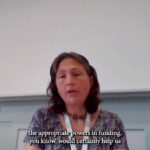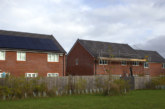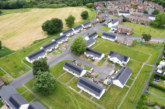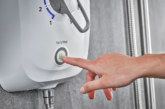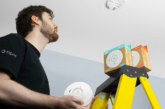Short-term competitive funding for local authorities is hampering clean air action across the UK, local leaders told MPs at an Environmental Audit Committee hearing on outdoor and indoor air quality targets on Wednesday, 6th September.
The committee was hearing evidence from local authority leaders from across the UK, including UK100 members, Essex County Council and Bath and North East Somerset Council. UK100 is the UK’s only cross-party network for local leaders committed to ambitious clean air and Net Zero action.
Testimony from Cllr Peter Schwier, Climate Czar and Cabinet Member for Environment, Waste Reduction and Recycling at Essex County Council, and Cllr Sarah Warren, Deputy Council Leader and Cabinet Member for Climate Emergency and Sustainable Travel at Bath and North East Somerset Council, reinforced the findings of UK100’s recent Powers in Place report, namely, the call for an end to disjointed, short-term, competitive funding in favour of sustained, strategic support that allows proper planning and implementation of clean air measures.
Bath and North East Somerset was the first local authority outside of London to introduce a charging Clean Air Zone to try and reduce tailpipe air pollution emissions. Cllr Warren, who was invited to give evidence on behalf of UK100, told the committee that Bath and North East Somerset Council has neither the powers it needs to effectively tackle indoor air pollution, from woodburners and gas boilers, nor suitable funding to support affordable public transport options to reduce car reliance.
Cllr Warren said: “If we wanted to tackle PM2.5 through doing more about wood burners, we don’t currently have powers to regulate the fuel that’s burnt or even to restrict the sale of damp wood again around gas boilers in people’s homes, which of course put nitrogen dioxide out into the atmosphere. Again, we don’t have powers or real clarity from government. [We] would not have any ability to go into people’s homes and ask them to change their gas boilers.
“And then I would go back to transport. And outside of London, it’s quite a different position in terms of public transport. Our supported bus network locally in Bath and North Somerset is really in many ways on the point of collapse. We don’t have a tube system, we don’t have the powers to put in place the alternatives to the car that people need.”
On competitive funding, Cllr Warren added: “If powers are to be devolved, it should be that the relevant amount of funding comes automatically to local authorities rather than specifically having to bid.”
Cllr Schwier told the committee: “With air quality, the current process of just bidding for [funding] is not really in the interest of long-term [change]… funding should be very long-term so that local authorities can make that adjustment and employ all that has been mentioned here with the expertise and the knowledge and the staffing levels in order to be able to help attain [clean air].
“Competitive bid funding is really difficult. It uses a lot of our resources to apply for that. So we would like to see that funding longer term to the investments in the cleaner, greener, active travel that we want to give not only for Essex but our residents and communities … this is an issue as regards to health that we all know is actually incredibly important to all of us in all of our lives at every moment.”
Cllr Schwier and Cllr Warren told MPs on the Environmental Audit Committee they wanted the Government to set more ambitious air quality targets in line with WHO air pollution limits, as opposed to the less ambitious Defra limits criticised by the Government’s own environmental watchdog, the Office for Environmental Protection.
Cllr Schwier said: “I think especially with PM2.5, actually, we ought to go higher and go to the WHO so that again, across the nation potentially we can have a universal standard that everybody could work to. And I think a high standard is a high standard to aim for is potentially to the benefit of not only us in Essex, but I think all of us in the long-term.”
Cllr Warren added: “I’d agree that the cleaner air quality strategy goes some way, but we would prefer to be moving towards a clear roadmap towards the World Health Organization targets and a road map to 2030.
“Actually in Bath and North East Somerset, we’ve indicated that we in the first instance would like to aspire to more demanding goals and that nationally set a target of 40 micrograms per cubic metre of nitrogen dioxide. And in the first instance, we’ve said work towards 36 as a stepping stone.
“But it would be really helpful to have a very clear and evidence-based national messaging strategy. Hopefully, that can be cross-party. We can all agree on the evidence. You know, let’s have really clear messaging.”
UK100’s Chief Executive, Christopher Hammond, said: “As the committee heard, there is a huge desire among local leaders to clean up our air and help us all breathe more easily. But, as we’ve been saying for a while now, short-term, competitive funding forces local authorities to jump through hoops and bad bureaucracy to access limited pots of money. This approach does not achieve the scale that Local Government needs and is no way to tackle an issue as serious as air pollution.
“We need wholesale reform to allow sustained, strategic investment in clean air measures across all parts of the country. Only then can we empower community leaders to deliver clean air and improved health for everyone.
“Whether we live in the inner city or a rural idyll, a flat or a house, we all deserve to breathe clean air. We must work together, across party political and geographical divides, to secure this basic right for everyone.”
Header image: Councillor Sarah Warren, Deputy Council Leader and Cabinet Member for Climate Emergency and Sustainable Travel at Bath and North East Somerset Council was a witness, on behalf of UK100, at the “Outdoor and indoor air quality targets” oral evidence session of the Environmental Audit Committee on Monday 6th September


